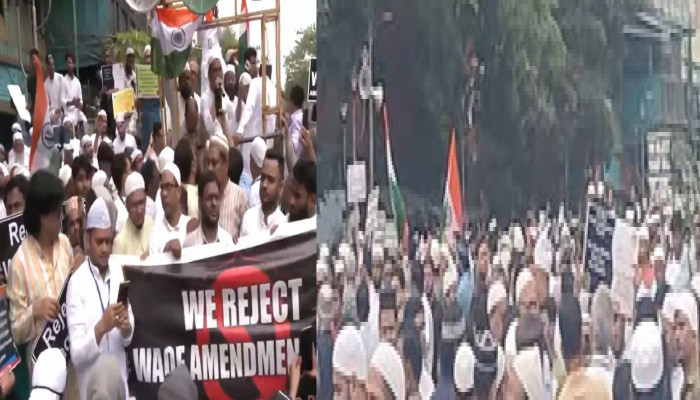Protest erupts in Kolkata, Chennai, Ahmedabad as Waqf bill clears parliament
- In Reports
- 06:20 PM, Apr 04, 2025
- Myind Staff
Thousands of people came together on the streets of Kolkata, Chennai, and Ahmedabad on Friday, after the Muslim community's weekly prayers, to protest against the Waqf Amendment Bill that was passed by Parliament earlier this week.
Images from the capital of Bengal showed a sizable throng gathered at public meeting locations, waving the national flag and holding signs that said, "We reject Waqf amendment" and "Reject Waqf Bill." According to news agency ANI, the Joint Forum for Waqf Protection organised a large number of the demonstrations. Visuals from the protests in Ahmedabad showed a tense situation. A video shared by ANI showed police trying to forcefully remove elderly protesters who were sitting on the road.
Similar incidents occurred in Chennai when a nationwide protest was announced by actor Vijay's Tamilaga Vettri Kazhagam. 'Reject the Waqf Bill' and 'do not take away Muslims' rights' were among the slogans chanted by TVK members who assembled in Chennai and other major cities, including Coimbatore and Chennai. The Tamil actor-politician, seen as a rising contender for next year's Assembly election, has criticised the Waqf Bill, calling it "anti-democratic."
He argued that its passage raises concerns about India's secular principles. The protests in Bengal are expected to intensify as the election approaches, especially with Chief Minister Mamata Banerjee already stating that she will ensure the state's Muslims don't lose their land. Accusing the BJP of attempting to divide the country, Mamata, echoing the Congress's stance, promised that the bill would be repealed once a non-BJP government takes power at the centre.
Many protesters are worried that the new Waqf laws might be applied to past cases, which could impact properties that already exist. But this week in Parliament, Union Minority Affairs Minister Kiren Rijiju, supported by Union Home Minister Amit Shah, clearly said that the law will only apply to future cases, not past ones. The changes to the Waqf laws, which deal with how Muslim charitable properties are managed, were passed in Parliament after almost 20 hours of intense debate.
Opposition leaders called the law "anti-Muslim," while government members described it as a "historic reform." The Waqf Amendment Bill is one step away from becoming law—it just needs President Droupadi Murmu’s approval, which is usually just a formality. The bill was passed in the Lok Sabha with 288 votes in favor and 232 against, and later in the Rajya Sabha with 128 in favor and 95 against.
One major change in the new Waqf law is that it now requires each state Waqf board and the central Waqf council to include two non-Muslim members. Another key rule says that anyone who wants to donate to a Waqf must prove they have been a practicing Muslim for at least five years. Many Muslims and opposition leaders have raised concerns about the bill. They fear that the central government might try to take control of Waqf boards. However, when presenting the bill in Parliament, Rijiju dismissed these concerns. He said that non-Muslims would no longer be allowed to interfere in the matters of the Waqf Board, as its management, formation, and the people it helps would only be from the Muslim community.
The discussions on the Waqf bill turned intense, with strong arguments and harsh words from both sides. Congress MP Sonia Gandhi described it as a "brazen assault" on the Constitution and accused the BJP of trying to keep the public divided all the time, calling it an attempt at "permanent polarisation".
Speaking at a meeting with her party's MPs, she also said that the bill was pushed through the Rajya Sabha forcefully or "bulldozed". A furious BJP demanded an apology from her. During a press conference on Friday afternoon, Rijiju highlighted that the Rajya Sabha had discussed the Waqf Bill for a record 17 hours and 2 minutes. In the Lok Sabha, the debate lasted for more than 12 hours.







Comments